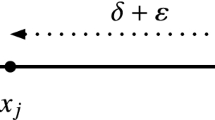Abstract
An axiomatic basis for a social preference ordering with interval-scaled utility levels satisfying the principles of anonymity and pareto superiority is elaborated. The ordering is required to be sensitive to distributional equality: Redistribution of utility income from poor to rich persons without changing their social rank should lead to a superior evaluation. The axiom of separability is weakened in order to make it compatible with distributional equality. We prove that every continuous ordering satisfying the upper axioms can be represented by a utility function which is positively linear on the convex cone of rank-ordered utility vectors. A modified unnormalized Gini coefficient is one possible choice, but it contradicts, as well as related proposals, the principle of adequacy of means for some distribution problems.
Similar content being viewed by others
References
Arrow, K. J.General Competetive Analysis, Holden-Day, San Francisco.
Fishburn, P. C.: 1966, ‘A Note on Recent Developments in Additive Utility Theories for Multiple-Factor Situations’,Operations Research 14, 1143–1148.
Kern, L.: 1977, ‘Comparative Distributive Ethics’, in: Gottinger, H. W. and Leinfeller, W. (eds.),Decision Theory and Social Ethics, Issues in Social Choice, Dordecht, pp. 187–200.
Mendola, J.: 1990, ‘An Ordinal Modification of Classical Utilitarianism’,Erkenntnis 33, 73–88.
Sen, Amartya K.: 1973,On Economic Inequality, Clarendon Press, Oxford.
Sen, Amartya K.: 1973, ‘On Ignorance and Equal Distribution’,The American Economic Review 63(5), 1022–1024.
Suppes, P.: 1977, ‘The Distributive Justice of Income Inequality’, in: Gottinger, H. W. and Leinfeller, W. (eds.),Decision Theory and Social Ethics, Issues in Social Choice, Dordrecht, pp. 303–320.
Trapp, R. W.: 1990, ‘Utilitarianism Incorporating Justice’ — A Decentralized Model of Ethical Decision Making’,Erkenntnis 32, 341–381.
Trapp, R. W. and A. Schäfer: 1989, ‘Distributional Equality in Non-Classical Utilitarism — A Proof of Lerner's Theorem for “Utilitarism Incorporating Justice”’,Theory and Decision 26(2), 157–173.
Author information
Authors and Affiliations
Rights and permissions
About this article
Cite this article
Schoch, D. An axiomatic basis for distributional equality in utilitarianism. Erkenntnis 40, 121–132 (1994). https://doi.org/10.1007/BF01128718
Received:
Revised:
Issue Date:
DOI: https://doi.org/10.1007/BF01128718



